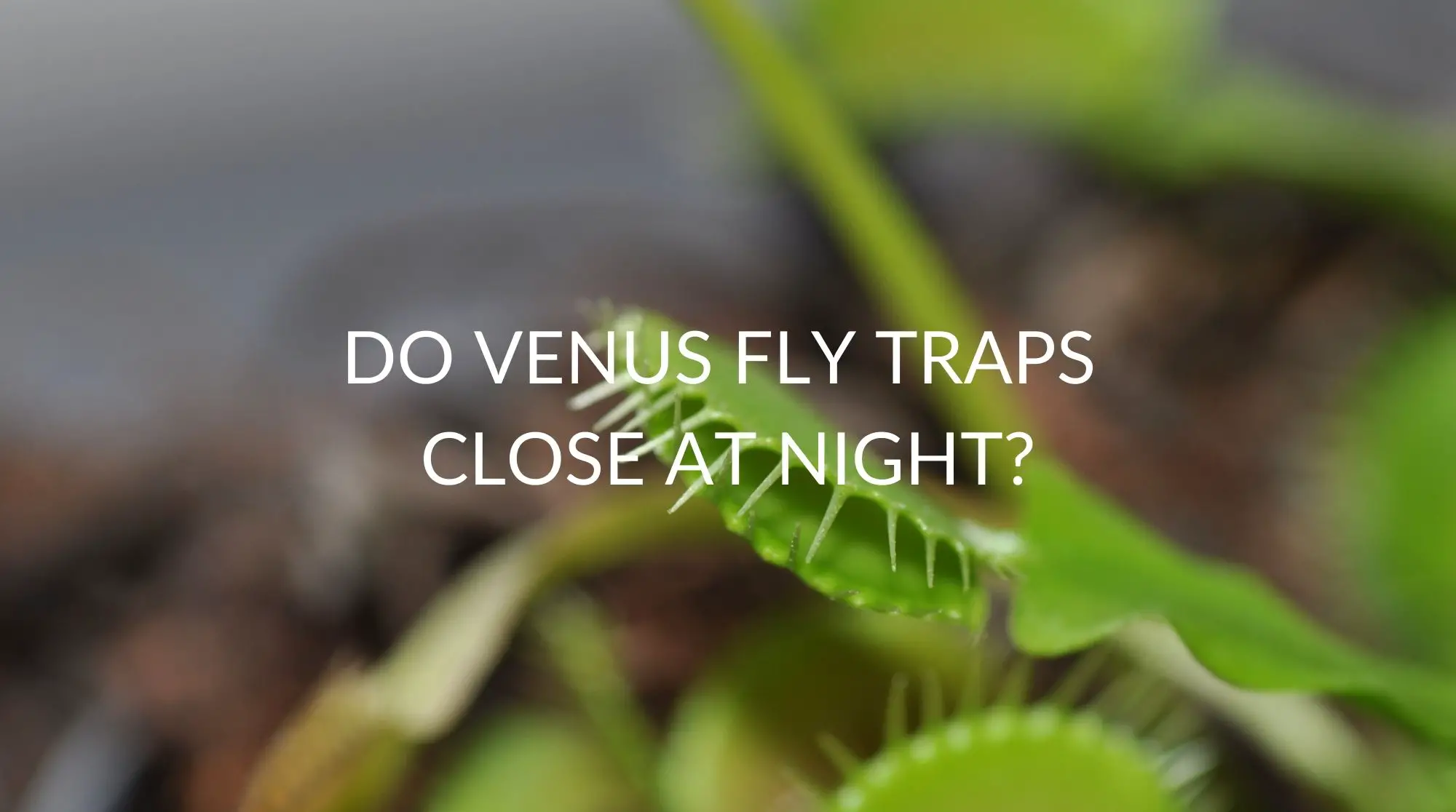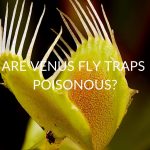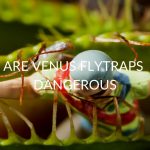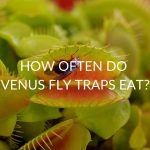Do Venus flytraps close at night, or do they only close when they want to? There are so many things to know about these fascinating plants, and watching them grow, catch prey, and flourish is very rewarding.
The Venus flytrap knows when it should open and close, as they’ve developed a lot of specific behaviors throughout its evolution. Most of the time, you don’t have to worry about how long it takes for traps to open and close, as they are very intuitive. However, knowing how Venus flytraps operate is essential to ensure you give them adequate care.
Why Is My Venus Fly Trap Closing?
Venus flytraps only try to close when absolutely necessary. Additionally, chances are high that more than one trap is closed at the same time. This is not necessarily a cause for concern. However, some things will trigger them to close that aren’t completely related to their natural eating and rest cycles.
A Trap Just Trapped Food
Once your Venus flytrap either catches food or has been fed, their traps will close. This allows them to break down the food and digest it.
Traps won’t close all the way at first; they will stay slightly open to determine if the food source is big enough for them to use energy to digest it. If it is, the trap will shut completely.
Something Has Triggered Them
If something lands on their traps and brushes against their trigger hairs at least twice, the trap will start to close. These hairs are what tell the Venus flytrap that food is inside. Sometimes a trap can tell whether or not what has landed on their trap is digestible, but sometimes they can’t.
You Have Played With Them
Some people enjoy watching the traps close on their Venus flytrap, so they’ll trigger the hairs with their fingers to see it. While it’s tempting to do this, you should avoid making them close on their own, as it causes them to waste a lot of much-needed energy. It could also shorten their lifespan.
It’s Dormant Season
Venus flytraps will stay closed in the winter months so they can restore their energy. They don’t need to be fed anything at this time. Indoor plants may need some assistance to trigger their dormancy, which is crucial to their survival.
Their Life Cycle Is Ending
Each trap has a natural life cycle that ends when they have served their purpose for the entire plant, and they will sometimes close when they are starting to die. Their color will also start to change. Don’t worry that your whole plant is dying; traps die, and new ones grow.
You’re Hand Feeding Them
While Venus flytraps can lure bugs in on their own because of their sweet smell, you can feed them yourself. The food can be either live bugs or dead bugs. If you feed them dead bugs, you’ll have to trigger the trap yourself by rubbing the bug against their hairs until the trap starts to close.
How Long Do Venus Fly Traps Stay Closed?
When the Venus flytrap catches prey, they will close and stay closed for a week or two. The process they use to break down their food, digest it, and spread the nutrients around to the rest of the plant takes some time. As you’ve probably noticed, the trap doesn’t crunch the food and swallow it; they dissolve it slowly with special enzymes.
If a trap is triggered to close and there is nothing inside of their trap to eat, they will reopen in about a day or two at the most. This could also happen if they catch food, but the prey manages to escape before they are able to close all the way. The traps don’t want to waste energy on something that isn’t worth the hassle.
There are situations when a trap will open up sooner if they accidentally close on something that isn’t edible. Unfortunately, this might also happen when they are fed dead bugs, but typically they’ll know better than to deny themselves food. If a non-food source falls into their trap, they’ll notice and open back up shortly after.
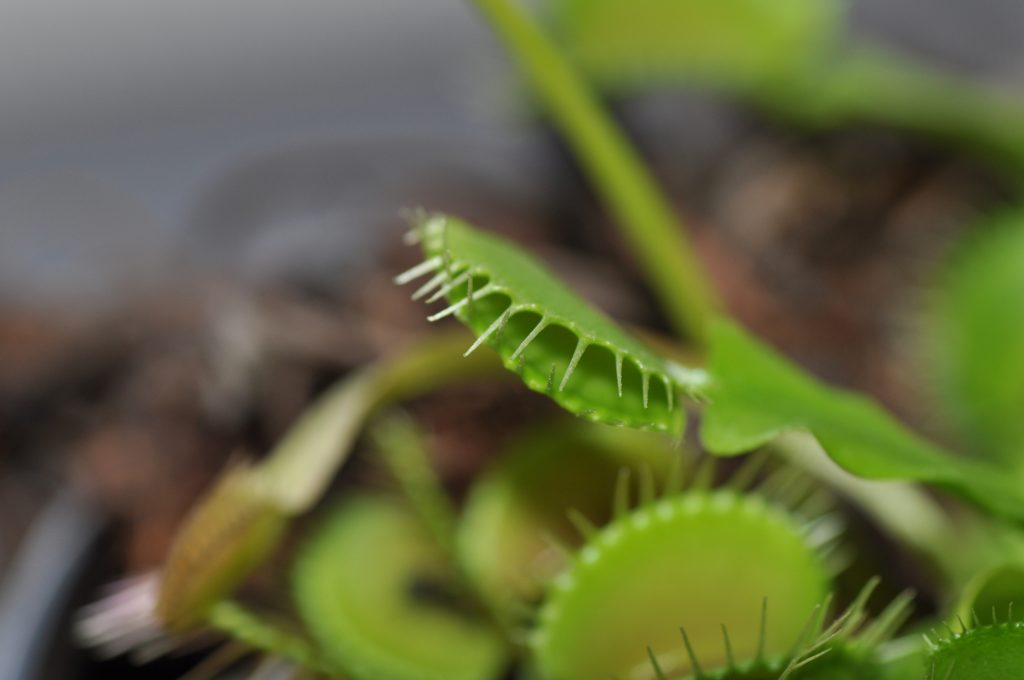
Do Venus Fly Traps Close At Night?
Venus flytraps do not close themselves at night; they only close when they are triggered. They can close at any time of the day when they are activated to. If your Venus flytrap is hungry, they don’t want to miss out on the chance to catch some food even when it’s dark. Their ability to lure in prey doesn’t stop at night, either.
If a Venus flytrap were to close all its traps at night, they would end up dying pretty fast. On average, traps can only open and close five times before they die; this can be slightly different between plants. This is why letting them have free reign over when they open and close is so important to let the plants live as long as possible.
Not only do Venus fly traps rely on sunlight for energy, but receiving nutrients from the insects that they eat helps the plant thrive. They use up a lot of energy to digest food, but they only exert this energy when they close. Thus, they don’t need to close to conserve energy at night because they have their own processes to do so.
Do Venus Fly Traps Open Back Up After Closing?
Venus flytraps will open back up after closing in most circumstances. There are some situations where traps stay closed for longer than usual, or they might not open back. Many first-time Venus flytrap owners will see their traps closed for months during winter and will think the plant is dead. This is because their natural life cycle requires them to lay dormant, usually between November to March.
If your Venus flytrap is indoors, you should change their conditions to allow them to naturally fall into dormancy. This includes reducing, but not eliminating, their light source and making their environment a little bit colder. It should be about 30 to 35 degrees Fahrenheit. Some traps might die at this time, but new ones will grow in their place.
If your Venus flytrap doesn’t open back up when it’s generally expected to, don’t try to force it open manually. It’s not necessary, and you could end up damaging the trap. It’s possible the plant is still working on gaining nutrients from a food source, but it’s also possible that the trap has just reached the end of its lifespan.
How Do Venus Fly Traps Know When To Close?
Venus fly traps are native to certain regions of North and South Carolina, where they grew in bad quality soil. They couldn’t get any nutrients from their native soil, and they still don’t get nutrients from the soil now. These intelligent plants began to adapt to their environment and found that they could catch some bugs and eat those to get the nutrients they needed.
Over time, the Venus flytrap perfected their ability to catch prey and are sometimes able to detect when something isn’t a suitable food source. If their small trigger hairs are not activated multiple times, they will not close. This is their way to avoid wasting energy on a non-food source.
There have been studies to try and determine how a Venus flytrap knows when and how to close. It’s suspected that there are calcium ions that flow to the traps when something brushes up against their trigger hairs. If their trigger hairs are touched at least twice within thirty seconds, the trap will snap shut.
Frequently Asked Questions
With how much research and observation has been done on the Venus flytrap, there is ample information out there to educate yourself if you want to bring a Venus flytrap home. If you already own one and want to make sure you’re doing everything right, it’s very easy to learn.
Do Venus Fly Traps Sleep?
Venus flytraps do not need to sleep. They have their own ways of conserving energy. During the winter, they will often go dormant to keep as much energy as possible and to help themselves grow.
Do Venus Fly Traps Die When They Close?
The trap being activated for any reason will not kill the Venus flytrap. However, each trap can only close so many times before it starts to die. This is their natural process, which is why it’s not recommended you trigger them to close unnecessarily.
Recap
Venus flytraps are one of the most adaptable plants, and despite them being endangered, they have brought themselves a long way through their captivating evolution. They don’t have to close at night or sleep to restore their energy. They are careful about how they spend their energy, which is why Venus flytraps can live a long and fruitful life for up to 20 years.

